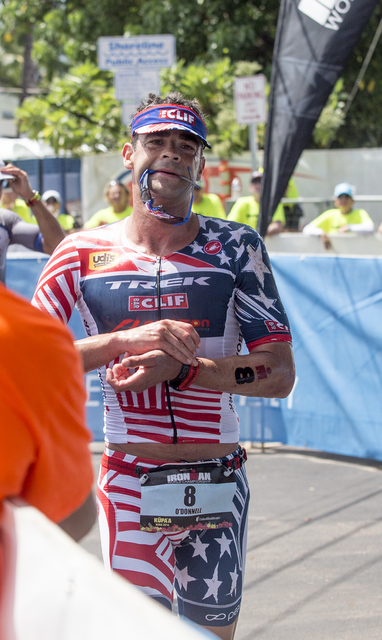KAILUA-KONA — The United States showed up and showed well in the 2016 Ironman World Championship, fielding 804 participants led by Ben Hoffman, who finished in fourth place. ADVERTISING KAILUA-KONA — The United States showed up and showed well in
KAILUA-KONA — The United States showed up and showed well in the 2016 Ironman World Championship, fielding 804 participants led by Ben Hoffman, who finished in fourth place.
But the performances of Hoffman, who completed the race in 8 hours and 13 minutes flat, and fellow American Tim O’Donnell, who finished sixth with a time of 8 hours, 16 minutes and 20 seconds, were overshadowed by a dominant showing from the German contingent.
German athletes, led by back-to-back champion Jan Frodeno and 2014 winner Sebastian Kienle, claimed every spot on the podium. Then their fellow countryman, Andi Boecherer, took fifth place just for good measure.
Hoffman, who finished second behind Kienle in 2014 and improved on that time by roughly six minutes this year, said he was proud of finishing atop American triathletes. But he added that his fourth place performance still left something to be desired.
“It’s comparable in a way to winning, but an actual win here is the ultimate,” he said. “It’s a good sort of secondary prize, if you call it that, to be the top American, and it’s really important to me to know I’m the best in the United States at the moment. But at the end of the day, my ultimate goal here is to win.”
He added the juggernaut Germans may hold an advantage because the range of popular sports isn’t as wide in Germany, where triathletes like Frodeno are typically held in similar esteem to renowned football players in America.
As the popularity of the sport continues to grow, Hoffman said he can eventually see the gap closing.
“Kids (in Germany) grow up thinking this is a viable way to be sort of a superstar, a sports icon in their country,” he explained. “That needs to happen in the U.S., and that’s not an easy process. I don’t expect it will happen anytime soon.”
Kienle had a different take on his country’s dominance — a vision far more fleeting than Hoffman’s.
“To be honest, we’re going to see a very strong American domination in probably like 10 years,” Kienle opined. “Triathlon programs are growing in the United States. When the U.S. starts something like this, it’s a tank. You can’t stop it.”
Hoffman didn’t start competing in triathlons until he was 20 years old, at which time he said he had zero background in swimming.
Still, he’s forged a successful career as a triathlete and believes his ceiling is high enough to one day wear the championship leis.
“I know I can run faster. I know I can ride faster,” he said. “I’d love to see (Americans) go under 8 hours here. I’d love to be the guy who did it. I’d love to win the race multiple times, and I don’t think I’m (at my ceiling).”
Hoffman held out hope for his dream of a world championship until more than halfway through the marathon portion of the race, which serves as its third and final leg.
But after the notion subsided and the realization that he wouldn’t spray the Kona crowd with champagne as the victor set in, he made a slight alteration to his motivation.
He wanted to make sure he was the first American across the finish line.
“It crossed my mind, I would say,” Hoffman said. “But at that stage, you’re just fighting to do the best you can in the moment.”



